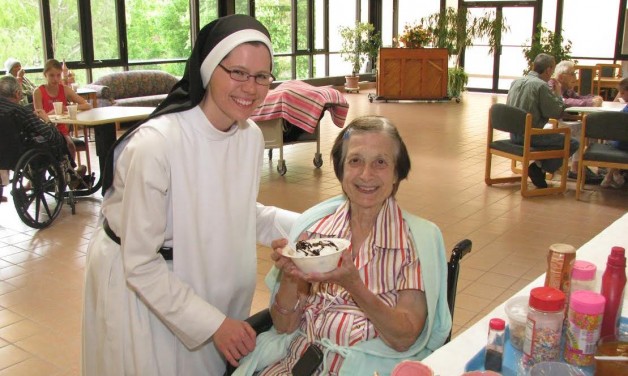There is no point in being a Christian unless we regard death as God’s greatest gift to us.
What did he say? Death is a gift, even God’s greatest? Death is no stranger to superlatives, but they usually come in the negative form: death is the most terrible reality; death is the final enemy; death is the worst defeat. Because of this, death avoidance becomes a wellspring of activity in modern society: nursing homes and hospitals keep it at a safe distance from the home, and euphemisms are commonly deployed in its description. Is not the euthanasia movement an extreme form of this avoidance in its attempt to master death through free choice? If death must happen, I will decide exactly when and how it happens! Of course the avoidance of death is not limited to the modern condition. In his famous study, The Denial of Death, Ernest Becker writes of its universal quality:
The idea of death, the fear of it, haunts the human animal like nothing else; it is a mainspring of human activity – activity designed largely to avoid the fatality of death, to overcome it by denying in some way that it is the final destiny for man.
Surely Fr. Oakes must be morbidly misinformed or manifestly mistaken, mustn’t he?
Well no, actually, although a distinction is desirable. It is not any old death that is the greatest gift, but a Christian death, a death given by God, which is the greatest gift. Why? Because in a Christian death one does not die alone; one dies with Christ. The Catechism puts it succinctly: “To rise with Christ, we must die with Christ” (1005). To be united with Christ fully, one must be united with him in his death, and therefore in our own deaths. Death has a new dimension, a new character, thanks to Christ’s death. The Catechism goes on to quote St. Paul in this new definition of death:
Because of Christ, Christian death has a positive meaning: “For to me to live is Christ, and to die is gain” (Phil 1:21).“The saying is sure: if we have died with him, we will also live with him” (2 Tm 2:11). What is essentially new about Christian death is this: through Baptism, the Christian has already “died with Christ” sacramentally, in order to live a new life; and if we die in Christ’s grace, physical death completes this “dying with Christ” and so completes our incorporation into him in his redeeming act. (1010)
This summer I have had the privilege of spending a month with the Dominican Sisters at Rosary Hill Home in Hawthorne, NY. The sisters here, part of a congregation founded by Rose Hawthorne (Mother Mary Alphonsa), the daughter of American writer Nathaniel Hawthorne, work day and night to assist cancer patients in just such a “dying with Christ.” Unlike many hospices that offer a kind of palliative care that involves the refusal of suffering and the denial of death, the sisters here offer truly passionate care: the suffering-with of compassion and the acceptance of death with Christ through his passion.
Death is not covered up or ignored at Hawthorne; patients are here to die well, to die with and in Christ. It is an incredible grace and truly a gift to die with the sisters; I can attest to this because of my experiences with both patients and their families. As one family member said: “This place is the closest thing to heaven on earth.” Those gifted enough to come to Rosary Hill are taught to die well, to die with Christ, to die with love and grace. Truly what a gift!
Unfortunately, not everyone can die in the care of the Hawthorne Dominicans (Young ladies, you can change this: vocations). And yet we all face death, the final enemy and proper punishment for our sins. Thankfully, like the patients at Rosary Hill, the Church has not left us alone in this serious task of dying well; she gives us daily numerous ways of preparing well. One way is to ask for a holy death every time we see a crucifix in our house (You don’t have one? Why not?) or Church. There are also excellent works dedicated to living well by thinking about dying well, both traditional (Dominican and Jesuit) as well as contemporary (written by a friend of mine). And of course we pray for such a holy death, through the intercession of Mary, at least fifty times a day in the rosary (You don’t pray the rosary every day? Really?). The Church encourages us to prepare ourselves for the hour of death (CCC 1114). After all, if this life is to be a sequela Christi, a following of Christ, one must follow him to death and through death. Christ’s call to each disciple “to deny himself and take up his cross daily” (Lk 9:23) finds new meaning and resonance in this daily reflection and preparation for death.
To die with Christ is truly a gift, a gift that may be the greatest because it is the way to unite ourselves with Christ. Christ offers us the gift of his death and we offer ourselves united to him through our own deaths as our final thanksgiving for all he has done. While not all of us will have the gift of dying with the Hawthorne Dominicans, we can all experience a hint of their charism with the help of the Church. And of course our death is not the final word, for the gift of death contains also the gift of the resurrection.
✠
Photo Credit: Sr. Marian, OP (Hawthorne)







